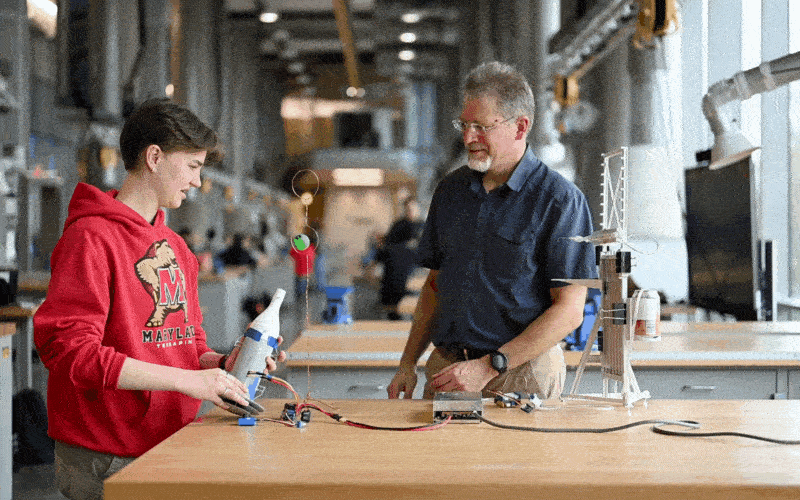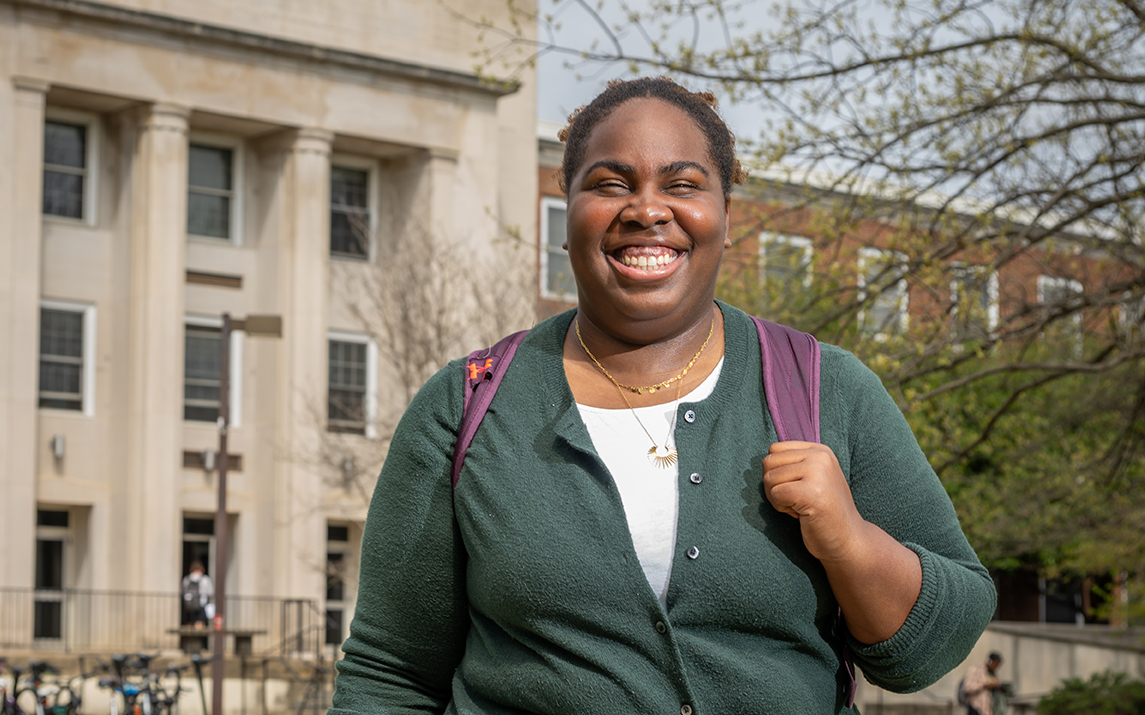Story by Erin Peterson
Jolicia Taylor ’26 chose Maryland Engineering for a host of practical reasons: the school offered the aerospace engineering major she wanted, it gave her the chance to follow in the footsteps of her older brother, and it was just a short drive from her home in Baltimore. Eager to use her education to create more sustainable fuel systems, Maryland’s focus on solving the world’s biggest challenges resonated with her.
Attending Maryland turned out to be a transformational choice. When she learned that she could study for a term in Spain while continuing to make steady progress on her major and simultaneously bolstering her resumé with top employers, she admits that it took her a while to wrap her mind around the idea. “I was like, ‘I can travel during school?” she recalls, still sounding somewhat incredulous. “I thought that was something only people in the movies did—it seemed totally unattainable.”
Aerospace engineering major Jolicia Taylor ’26. (Photo by: Maximilian Franz)
Thanks to Maryland’s Office of Global Engineering Leadership, it wasn’t.
In January 2024, Taylor packed her bags for four months in the Spanish capital of Madrid, where she took classes in differential equations, linear algebra, thermal and quantum physics, thermodynamics, and a specially tailored class that discussed U.S. identity in a global context.
Taylor’s moment of seeing the expansive possibility of international travel within her college experience was no accident, says Assistant Dean for Engineering Student Affairs Ramsey Jabaji. “Maryland Engineering spends a significant amount of time aligning and mapping the study abroad curriculum with students’ core engineering requirements,” he says, a strategy that gives more students opportunities to have rich, rewarding international experiences—and a leg up as they look ahead. “Engineering alums often talk about how they’ve been fast-tracked into leadership roles, because they’ve already demonstrated an ability and willingness to take risks and engage in global work.”
Taylor’s experience exemplifies the benefits of this philosophy. After spending months in Spain, where she picked up conversational Spanish, soaked in cultural sites like the Palace of Madrid, and took train trips to Barcelona and Paris, she returned to College Park invigorated and ready to live a life bigger than she could have imagined. “The perspective that you get from learning about a different culture, living differently than how you’re currently living, is invaluable,” she says.
And while Taylor, who still has a few semesters left before graduation, isn’t certain about what might be next for her, she’ll have plenty of options. Companies with an international footprint, including L3Harris and TE Connectivity, where Taylor has interned, are hungry for employees and leaders who can bring a global perspective to their work.
“This is a differentiator for students,” says Jabaji, noting that while just five to seven percent of engineers nationwide study abroad by graduation, Maryland Engineering’s numbers, at 29 percent, are more than quadruple that. “We hear a lot of stories about the way that study abroad comes up in internship and job interviews.”
No matter what she does next, Taylor will carry with her a powerful sense of independence and adaptability. “It was a little scary at first to think about living in a different country—I had never been more than a few hours from my parents’,” she says. “But I did it, and I came back with so much more confidence.”
Study abroad is one of the ways that Maryland Engineering empowers students to become leaders, doers, and attuned members of a global community. Through nationally competitive clubs, faculty-mentored research, personalized career services, and communities that help students understand and strengthen the non-technical skills that will help them in the working world, students have a vibrant college experience. They also gain tools that will help them work effectively on big problems and lead organizations that tackle complex global issues.
Read on to learn how we help students “major in the future,” and how this approach is succeeding.


 Transform Academic Theory to Real-World Impact
Transform Academic Theory to Real-World Impact Showcase Your Superpowers to Employers
Showcase Your Superpowers to Employers Learn and Navigate the Unwritten Rules for Success
Learn and Navigate the Unwritten Rules for Success Forge Meaningful Relationships that Support Health and Success
Forge Meaningful Relationships that Support Health and Success Build the Skill of Understanding and Working Across Differences
Build the Skill of Understanding and Working Across Differences Find Your Crew
Find Your Crew The ROI of Passion? Incalculable.
The ROI of Passion? Incalculable. 